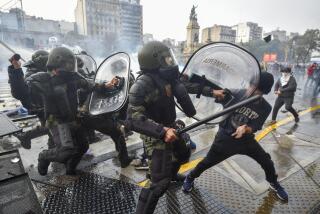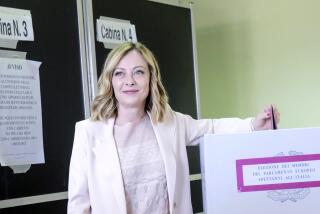Italian Vote Likely to Usher in New Government : Referendum: Even before balloting ends today, prime minister and president will confer on a changing of the guard.
- Share via
ROME — Under smiling spring skies and amid a confusion of multihued ballots, Italy voted Sunday in a national referendum on electoral reform that could revolutionize its political future.
However the vote goes, one early result is likely to be a government reshuffle in coming days.
Even before the returns are in after a second day of voting today, Prime Minister Giuliano Amato says he will confer with President Oscar Luigi Scalfaro this afternoon about forming a new government.
Electoral reform, key among eight referendum questions, each with its own distinctive colored ballot, is expected to win easily. Supported by all major political parties, the reform would scrap the system of proportional representation that has given Italy 51 weak coalition governments since World War II.
About a third of Italy’s 48 million voters had cast ballots by nightfall Sunday, a higher turnout than in other recent referendums. Italians also voted on propositions to end government financing of political parties and to decriminalize personal drug use, as well as on five questions demanding the streamlining of one of Western Europe’s most notoriously featherbedded government bureaucracies.
Supporters of electoral change, which would initially require direct election of two-thirds of the Senate, called for a 60% yes vote as a signal that Italians want to strip power from long-dominant political parties lately scarred by a nationwide corruption scandal that is the worst in modern history.
Amato, the custodian of a beleaguered government that has lost seven Cabinet ministers since he took office last June, said over the weekend that his work was “almost finished.”
The 53-year-old Amato has said repeatedly that he will offer to step down after the referendum. Analysts say Scalfaro is weighing whether to ask him to continue as head of a caretaker government or to replace Amato with a nonpartisan “technical” government. In either case, the first priority of the government would be to arrange new elections by autumn.
In the northern city of Bergamo on Sunday, a large crowd of voters jammed a polling station to applaud as Judge Antonio Di Pietro cast his ballot. The Milan magistrate launched the corruption investigation 15 months ago that has by now netted about 2,600 mostly prominent business leaders and politicians in a network of bribes, payoffs and kickbacks for public contracts.
Di Pietro cast his ballot buoyed by a promise of full cooperation with his inquiries made Saturday by Gianni Agnelli, chairman of Fiat, the country’s largest private corporation, and head of a blue-ribbon list of firms implicated in the scandal. A number of top Fiat managers are under arrest, and at least four others with arrest warrants pending are sheltering abroad.
Virtually all the leaders of Italy’s major political parties have also been named in the scandal for accepting illegal party funding.
In addition, seven-time former Prime Minister Giulio Andreotti is under accusation for alleged links with the Sicilian Mafia. After the election, a Senate commission must decide this week whether to lift Andreotti’s parliamentary immunity to allow magistrates in Palermo to press charges against him based on the testimony of Mafia turncoats.
More to Read
Sign up for Essential California
The most important California stories and recommendations in your inbox every morning.
You may occasionally receive promotional content from the Los Angeles Times.













